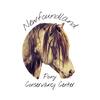Facts About Horses
You can find facts about horses pretty much anywhere you look, but did you know thatNewfoundland Ponies were traditionally referred to as horses? Since our passion is Newfoundland Ponies and since little information is readily available about this very rare, critically endangered breed, we'd like to share some fascinating facts about them.
|
|
Despite being so special, due to mass slaughter,there are only 250 breeding Newfoundland Ponies left in the world. We wish that sad fact was not true.
